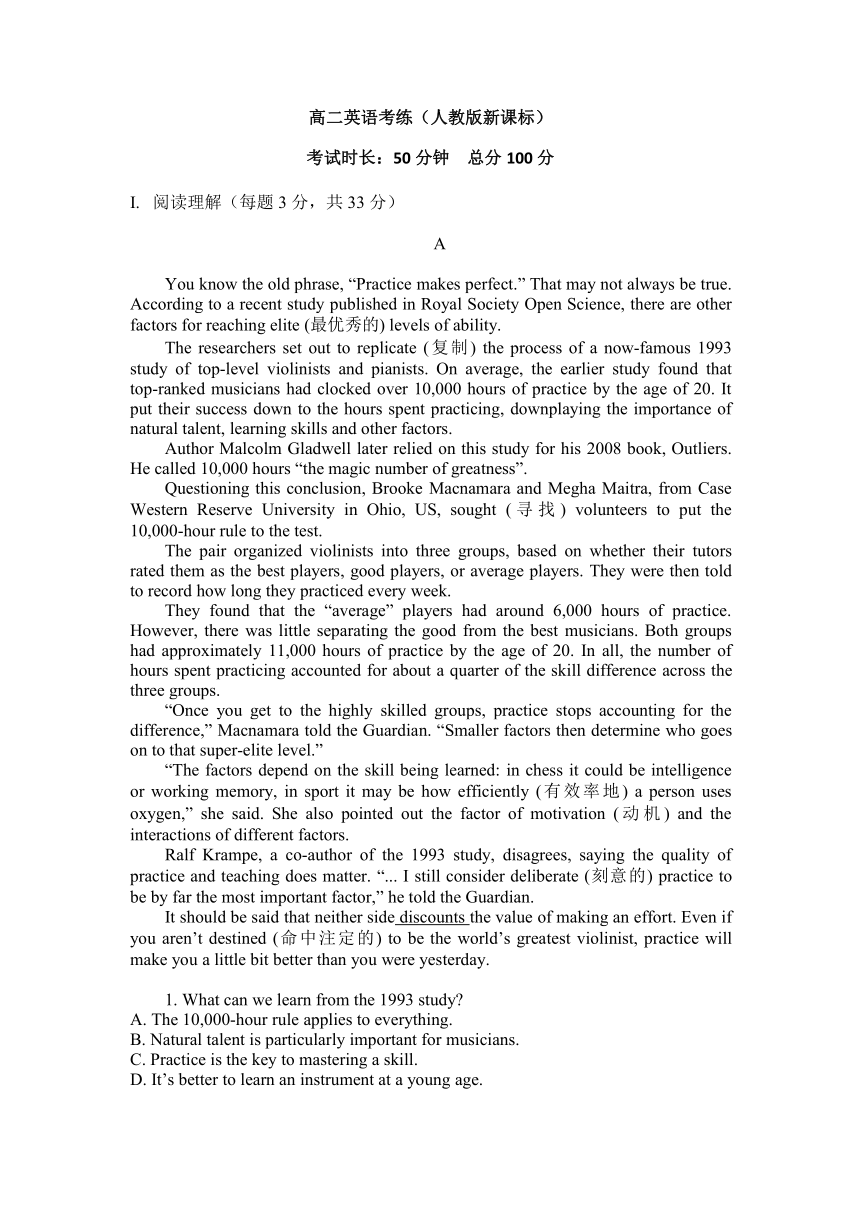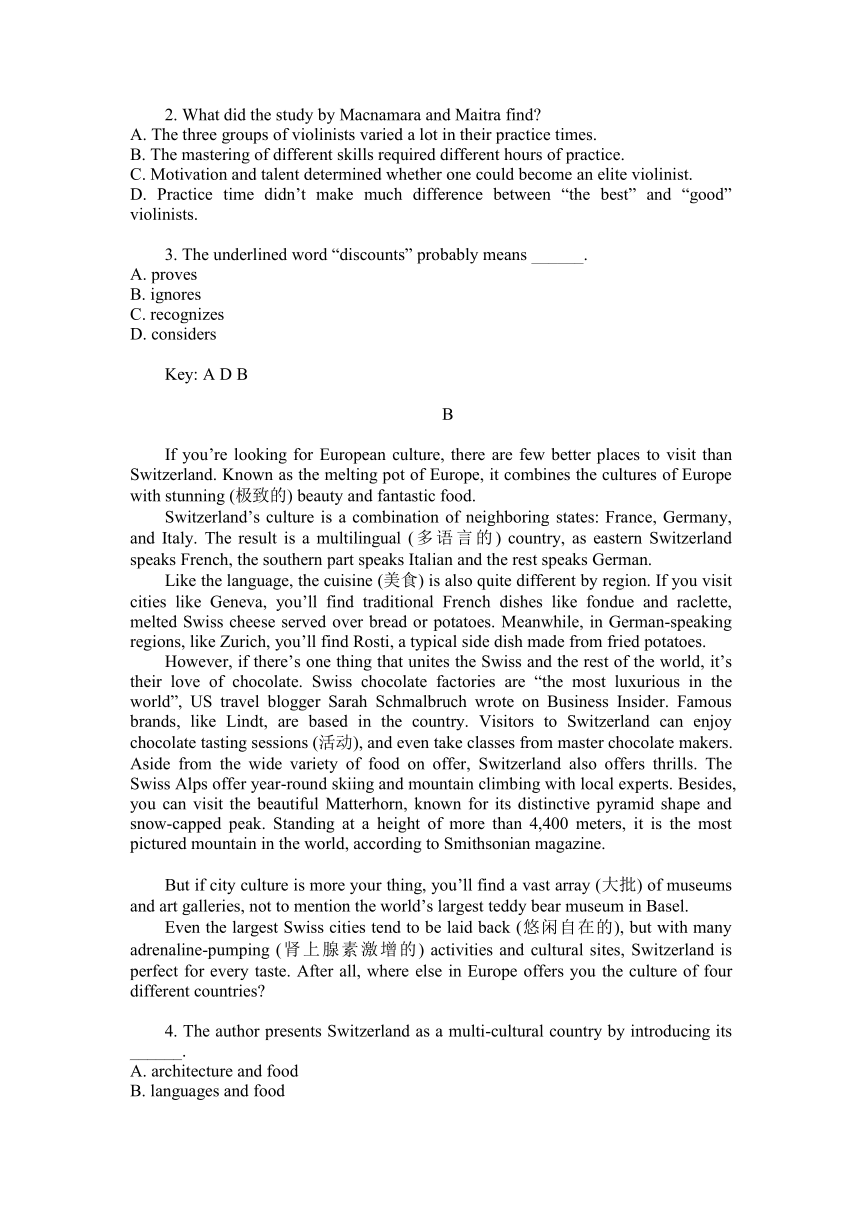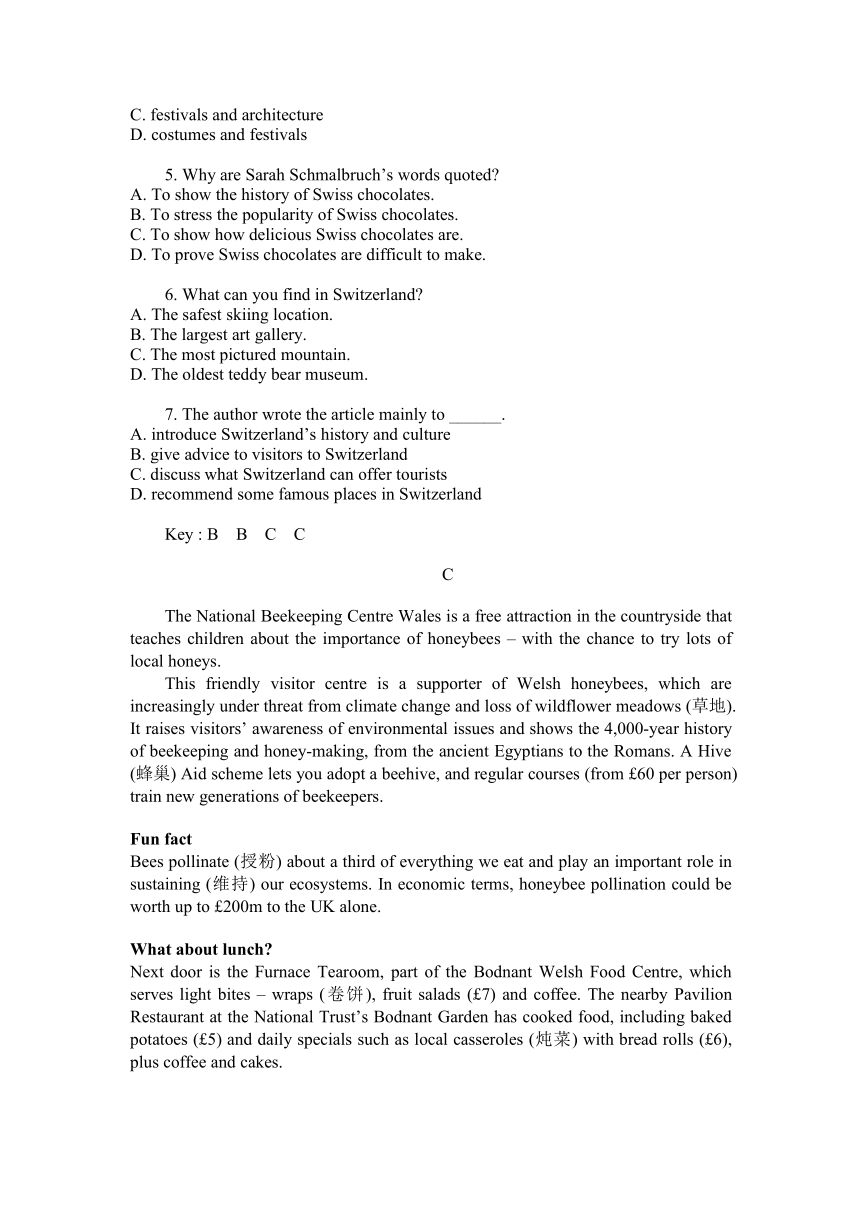2020年春人教版选修七高二英语限时考练 含答案
文档属性
| 名称 | 2020年春人教版选修七高二英语限时考练 含答案 |  | |
| 格式 | zip | ||
| 文件大小 | 44.0KB | ||
| 资源类型 | 教案 | ||
| 版本资源 | 人教版(新课程标准) | ||
| 科目 | 英语 | ||
| 更新时间 | 2020-03-05 22:42:53 | ||
图片预览



文档简介
高二英语考练(人教版新课标)
考试时长:50分钟 总分100分
I. 阅读理解(每题3分,共33分)
A
You know the old phrase, “Practice makes perfect.” That may not always be true. According to a recent study published in Royal Society Open Science, there are other factors for reaching elite (最优秀的) levels of ability.
The researchers set out to replicate (复制) the process of a now-famous 1993 study of top-level violinists and pianists. On average, the earlier study found that top-ranked musicians had clocked over 10,000 hours of practice by the age of 20. It put their success down to the hours spent practicing, downplaying the importance of natural talent, learning skills and other factors.
Author Malcolm Gladwell later relied on this study for his 2008 book, Outliers. He called 10,000 hours “the magic number of greatness”.
Questioning this conclusion, Brooke Macnamara and Megha Maitra, from Case Western Reserve University in Ohio, US, sought (寻找) volunteers to put the 10,000-hour rule to the test.
The pair organized violinists into three groups, based on whether their tutors rated them as the best players, good players, or average players. They were then told to record how long they practiced every week.
They found that the “average” players had around 6,000 hours of practice. However, there was little separating the good from the best musicians. Both groups had approximately 11,000 hours of practice by the age of 20. In all, the number of hours spent practicing accounted for about a quarter of the skill difference across the three groups.
“Once you get to the highly skilled groups, practice stops accounting for the difference,” Macnamara told the Guardian. “Smaller factors then determine who goes on to that super-elite level.”
“The factors depend on the skill being learned: in chess it could be intelligence or working memory, in sport it may be how efficiently (有效率地) a person uses oxygen,” she said. She also pointed out the factor of motivation (动机) and the interactions of different factors.
Ralf Krampe, a co-author of the 1993 study, disagrees, saying the quality of practice and teaching does matter. “... I still consider deliberate (刻意的) practice to be by far the most important factor,” he told the Guardian.
It should be said that neither side discounts the value of making an effort. Even if you aren’t destined (命中注定的) to be the world’s greatest violinist, practice will make you a little bit better than you were yesterday.
1. What can we learn from the 1993 study?
A. The 10,000-hour rule applies to everything.
B. Natural talent is particularly important for musicians.
C. Practice is the key to mastering a skill.
D. It’s better to learn an instrument at a young age.
2. What did the study by Macnamara and Maitra find?
A. The three groups of violinists varied a lot in their practice times.
B. The mastering of different skills required different hours of practice.
C. Motivation and talent determined whether one could become an elite violinist.
D. Practice time didn’t make much difference between “the best” and “good” violinists.
3. The underlined word “discounts” probably means ______.
A. proves
B. ignores
C. recognizes??? ?
D. considers
Key: A D B
B
If you’re looking for European culture, there are few better places to visit than Switzerland. Known as the melting pot of Europe, it combines the cultures of Europe with stunning (极致的) beauty and fantastic food.
Switzerland’s culture is a combination of neighboring states: France, Germany, and Italy. The result is a multilingual (多语言的) country, as eastern Switzerland speaks French, the southern part speaks Italian and the rest speaks German.
Like the language, the cuisine (美食) is also quite different by region. If you visit cities like Geneva, you’ll find traditional French dishes like fondue and raclette, melted Swiss cheese served over bread or potatoes. Meanwhile, in German-speaking regions, like Zurich, you’ll find Rosti, a typical side dish made from fried potatoes.
However, if there’s one thing that unites the Swiss and the rest of the world, it’s their love of chocolate. Swiss chocolate factories are “the most luxurious in the world”, US travel blogger Sarah Schmalbruch wrote on Business Insider. Famous brands, like Lindt, are based in the country. Visitors to Switzerland can enjoy chocolate tasting sessions (活动), and even take classes from master chocolate makers.
Aside from the wide variety of food on offer, Switzerland also offers thrills. The Swiss Alps offer year-round skiing and mountain climbing with local experts. Besides, you can visit the beautiful Matterhorn, known for its distinctive pyramid shape and snow-capped peak. Standing at a height of more than 4,400 meters, it is the most pictured mountain in the world, according to Smithsonian magazine.
But if city culture is more your thing, you’ll find a vast array (大批) of museums and art galleries, not to mention the world’s largest teddy bear museum in Basel.
Even the largest Swiss cities tend to be laid back (悠闲自在的), but with many adrenaline-pumping (肾上腺素激增的) activities and cultural sites, Switzerland is perfect for every taste. After all, where else in Europe offers you the culture of four different countries?
4. The author presents Switzerland as a multi-cultural country by introducing its ______.
A. architecture and food
B. languages and food
C. festivals and architecture
D. costumes and festivals
5. Why are Sarah Schmalbruch’s words quoted?
A. To show the history of Swiss chocolates.
B. To stress the popularity of Swiss chocolates.
C. To show how delicious Swiss chocolates are.
D. To prove Swiss chocolates are difficult to make.
6. What can you find in Switzerland?
A. The safest skiing location.
B. The largest art gallery.
C. The most pictured mountain.
D. The oldest teddy bear museum.
7. The author wrote the article mainly to ______.
A. introduce Switzerland’s history and culture
B. give advice to visitors to Switzerland
C. discuss what Switzerland can offer tourists
D. recommend some famous places in Switzerland
Key : B B C C
C
The National Beekeeping Centre Wales is a free attraction in the countryside that teaches children about the importance of honeybees – with the chance to try lots of local honeys.
This friendly visitor centre is a supporter of Welsh honeybees, which are increasingly under threat from climate change and loss of wildflower meadows (草地). It raises visitors’ awareness of environmental issues and shows the 4,000-year history of beekeeping and honey-making, from the ancient Egyptians to the Romans. A Hive (蜂巢) Aid scheme lets you adopt a beehive, and regular courses (from ?60 per person) train new generations of beekeepers.
Fun fact
Bees pollinate (授粉) about a third of everything we eat and play an important role in sustaining (维持) our ecosystems. In economic terms, honeybee pollination could be worth up to ?200m to the UK alone.
What about lunch?
Next door is the Furnace Tearoom, part of the Bodnant Welsh Food Centre, which serves light bites – wraps (卷饼), fruit salads (?7) and coffee. The nearby Pavilion Restaurant at the National Trust’s Bodnant Garden has cooked food, including baked potatoes (?5) and daily specials such as local casseroles (炖菜) with bread rolls (?6), plus coffee and cakes.
Exit through the gift shop
There is a range of bee-themed gifts in our gift shop, including bee toys (?2), wooden honey candy (?2) and a selection of honeys all made by Welsh producers (?5). The bestselling Bodnant honey (?8) goes fast.
Getting here
We are located just off the A470 on the Bodnant Estate in the Conwy Valley, and 10 minutes from the A55 north Wales coast road. Follow the brown signs just after Bodnant Gardens.
Value for money
Visits and activities for kids are free, though donations are welcome. Taster days (from ?60) and the weekend beekeeping course (?80 per person) are held at Abergwyngregyn village, 10 miles west down the A55.
Opening hours
The Visitor Centre opens daily from 10 am-4 pm but it is volunteer-run, so phone ahead to check. Expect lots of fun activities around the annual Conwy Honey Fair.
8. What do we know about the National Beekeeping Centre Wales?
A. It makes money mainly by selling local honeys.
B. It invites visitors to adopt a beehive for free.
C. It’s an educational center about beekeeping.
D. It shows visitors Wales’ long beekeeping history.
9. You can buy _______ at the Furnace Tearoom.
A. bread rolls
B. fruit salads
C. baked potatoes
D. local casseroles
10. Where is the National Beekeeping Centre Wales?
A. In the village of Abergwyngregyn.
B. Opposite Bodnant Gardens.
C. Off the A55 Wales coast road.
D. Close to the A470 on the Bodnant Estate.
11. How much would you have to pay for the weekend course and two bee toys?
A. ?64?? ??? ?B. ?76
C. ?84?? ??? ?D. ?96
Key: C B D C
II. 语法填空(每题3分,共30分)
There were two men 12. ________ (live) next to each other, both with large gardens. One of them was a retired teacher and the other was a baker. The teacher 13. ________ (rare) cared for the plants in his garden, but the baker was very careful 14. ________ his plants. Therefore, the teacher’s plants were small, while the baker’s plants were much bigger and greener.
One night, 15. ________ heavy storm hit the village. The next morning, both of the 16. ________ (neighbor) came out to check on their gardens. The baker saw that his plants 17. ________ (destroy). However, the teacher’s plants were not damaged at all and stood firm.
18. ________ (surprise), the baker asked the teacher, “We both grew the same plants and I cared for my plants better 19. ________ you did. How are your plants still OK?”
The teacher smiled and said, “You gave your plants too much attention, so you made 20. ________ too easy for them to grow. I gave my plants just a little bit of water, so their roots had to grow deeper 21. ________ (find) more by themselves. That’s why my plants survived.”
12. living ?? ??? 13. rarely ?? ?????14. with ?? ?15. a ?? ???16. neighbors
17. were destroyed 18. Surprised? 19. than ?? ?20. it ?? ??? 21. to find
III改错(每题1.5分,共15分)
When I was studying in China, my school held a singing contest. I signed up although I really loved singing. I sang with a girl named as Jenny. She’s one of my best friend. Unfortunately, I forgot the lyrics for a moment while they sang. I was standing onstage, look nervous. Not surprisingly, we lose the contest. I felt very sadly. Jenny comforted me by saying, “There will be another chance.” One week late, at our school’s art festival, we sang a song together again. It was unforgettable and touching afternoon. I want to thank Jenny, whom didn’t give up on me when I felt down.
22. although→because/as/since??? 23. 去掉as 24. friend→friends 25. they→we
26. look→looking 27. lose→lost?? 28. sadly→sad???? 29. late→later
30. unforgettable前∧an ?? ??? 31. whom→who
IV. 选修7单词测试(每题1分,共22分)
32. Her son is filled with a________(雄心,报负) to become a great inventor.
33. In my opinion, he is just not s______(适合的) for the job.
34. She was a_______(颇为生气的) that he had forgotten his birthday.
35. His c_______(行为) disagrees with his words.
36. His wages are a_____(足够的) to support three people.
37. He has a strong d______ for success.
38. When a couple wanted to end their marriage, that means they wanted to get d_____.
39. There is no need for you to have s_______ for those kids, for they are all wrongdoers.
40. Anna was reading a piece of science f_______ and completely lost in the book.
41. He didn’t seem to mind r_____ (思考) on the issue.
42. Thank you for your letter, which took a __________(两星期) to arrive.
43. Last month, the businessman d_____(捐赠) a lot of money to the hospital.
44. Can you explain how the machine o_______(运转)?
45. She never ______(参加) in any of our discussions, does she?
46. They’ve just p______(购买) a new house in the countryside.
47. Foreigners often have trouble with ______(习语,成语) like “draw a bath”.
48. I am fully _______(已被占用的) with my daily work.
49. I am going to ______(讲课) to my students today.
50. It’s difficult to ________(驳斥) someone politely.
51. Seize the chance, ______(否则) you’ll regret it.
52. Could you help me d______(分发) the books to the students?
53. We strongly r_______(推荐) reporting the incident to the police.
32. ambition 33. suitable 34. annoyed 35. conduct 36. adequate 37. desire 38. divorced 39. sympathy 40. fiction 41. reflecting 42. fortnight 43. donated 44. operates 45. participates 46. purchased 47. idioms 48. occupied 49. lecture 50. contradict 51. otherwise 52. distribute 53. recommend
33.
